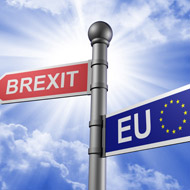European vets issue plea to Brexit negotiators

The Brexit negotiation plea highlights the vital role of vets in public goods and global societal concerns.
European vets are calling on Brexit negotiators not to jeopardise animal welfare, surveillance and medicines.
The ‘Brexit negotiation plea’, issued by the Federation of Veterinarians of Europe (FVE), comes ahead of the next round of negotiations in Brussels. Developed with the BVA and the RCVS, it highlights the vital role of vets in public goods and global societal concerns, such as antimicrobial resistance.
“Infectious diseases don’t respect borders, so assuring animal health, public health, food safety and animal welfare require an international approach,” said FVE president Rafael Laguens. “More than ever a continued close collaboration within the European veterinary profession and with international stakeholders is essential for ensuring the interests of animals and people everywhere.”
The plea outlines five key asks of EU and UK politicians and decision makers, including continued mutual recognition of veterinary degrees and no reduction in the availability of veterinary medicines. The organisations also ask that, for every animal or product that is imported or exported, specially trained Official Veterinarians must supervise the process to and from third countries.
“We are united with colleagues across Europe in our call to secure working rights for UK and EU vets within the Brexit negotiations,” commented Gudrun Ravetz, senior vice president of the BVA. “Vets are absolutely vital in facilitating trade - by certifying meat through to gelatine in sweets, and ensuring standards - so that consumers have confidence in the welfare and food safety of the products they choose to buy at times like this, when it’s most needed.”
RCVS president Stephen May added: “The RCVS welcomes the call from our European colleagues to protect the rights of EU-qualified vets in the UK and UK-qualified vets in the EU post-Brexit, and to maintain our high standards of animal health and welfare.
“We also welcome the continued ability for suitably qualified vets, including specialists, to have their qualifications recognised both in the EU and in the UK to ensure that the profession can continue to work and collaborate across borders, whether in practice, industry or research. We are very pleased that the FVE’s position on Brexit is broadly in line with our own Brexit Principles.”



 The Animal and Plant Health Agency (APHA) has updated its online reporting service for dead wild birds.
The Animal and Plant Health Agency (APHA) has updated its online reporting service for dead wild birds.